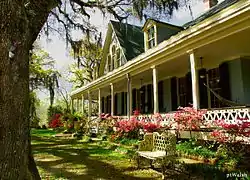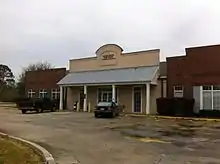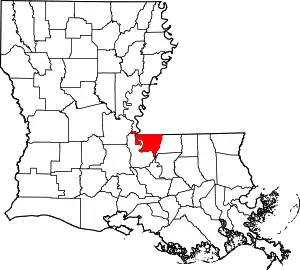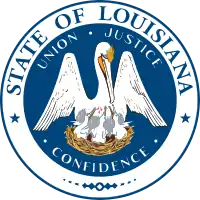St. Francisville, Louisiana
St. Francisville is a town in, and the parish seat of, West Feliciana Parish, Louisiana, United States.[5] The population was 1,765 at the 2010 census. It is part of the Baton Rouge Metropolitan Statistical Area.
St. Francisville, Louisiana | |
|---|---|
Town | |
 One of several former plantation houses near St. Francisville | |
 Location of St. Francisville in West Feliciana Parish, Louisiana. | |
.svg.png.webp) Location of Louisiana in the United States | |
| Coordinates: 30°47′05″N 91°22′50″W | |
| Country | United States |
| State | Louisiana |
| Parish | West Feliciana |
| Established | 1809 |
| Government | |
| • Mayor | Billy D'Aquilla[1][2] |
| Area | |
| • Total | 1.84 sq mi (4.76 km2) |
| • Land | 1.82 sq mi (4.71 km2) |
| • Water | 0.02 sq mi (0.05 km2) |
| Elevation | 115 ft (35 m) |
| Population (2010) | |
| • Total | 1,765 |
| • Estimate (2019)[4] | 1,625 |
| • Density | 892.86/sq mi (344.80/km2) |
| Time zone | UTC-6 (CST) |
| • Summer (DST) | UTC-5 (CDT) |
| ZIP Code | 70775 |
| Area code(s) | 225 |
| FIPS code | 22-67215 |
| Website | stfrancisville |
Geography
St. Francisville is located at 30°47′5″N 91°22′50″W.[6] According to the United States Census Bureau, the town has a total area of 1.8 square miles (4.7 km2), all land.
History
The current town of St. Francisville was established on May 11, 1809 by John H. Johnson, and was originally known as the Villa of St. Francis. A number of historic structures from that period still exist. Called "the town two miles long and two yards wide" because it was developed atop a narrow ridge overlooking the Mississippi River, it was the commercial and cultural center of the surrounding plantation country. Below St. Francisville's bluffs, another early settlement called Bayou Sara had been established by French colonists in the early 1790s. It was at one time the largest antebellum Mississippi River port between New Orleans and Memphis, but was superseded by Natchez. The settlement was gradually destroyed by repeated flooding and fires, and nothing exists of Bayou Sara today. A few of its surviving structures were hauled up the hill into St. Francisville in the 1920s. This area and other former French-controlled territories east of the Mississippi River was taken over by Great Britain after it defeated France in the Seven Years' War in 1763.
At the end of the American Revolutionary War, Great Britain ceded what it called West Florida to Spain in 1783, as part of the Treaty of Paris. There were years of contention as to exactly where the eastern boundary of the 1803 Louisiana Purchase was—depending on which treaty was cited, as France, Great Britain, and Spain had redrawn the boundaries among themselves during the second half of the 18th century. Spain continued to claim territory on the eastern side of the Mississippi River until it and the United States settled this issue in the Pinckney Treaty. This region is today called the Florida Parishes.
In 1810, St. Francisville served as the capital of the Republic of West Florida, when area planters ousted the Spanish government of the Baton Rouge District and set up their own independent republic for 74 days, before being annexed to the Territory of Orleans, as a possession of the United States.
In 1824, when Feliciana Parish was split into East and West, St. Francisville became the seat of West Feliciana Parish's government.
In June 1863, Confederate Army officer William Walter Leake arranged for the burial here of Union Navy officer John E. Hart, who had died aboard his ship while taking part in the Union blockade of the Mississippi River. This event is re-enacted every June during a three-day commemoration called "The Day the War Stopped."[7]
After the American Civil War, some Jewish emigrants fleeing religious persecution in Germany settled here. They made important contributions to commerce in the lean years following the war. Becoming successful merchants, they provided credit when the banks failed and built impressive Victorian homes, such as the Wolf-Schlessinger House. It is now operated as the St. Francisville Inn Bed and Breakfast.
2000 to present
In recent years, community efforts have focused on restoration and preservation of the town's historic homes. St. Francisville is a popular tourist destination, with a number of restored historic plantations open for tours, including Rosedown Plantation State Historic Site, Audubon State Historic Site, Butler Greenwood Plantation, the Myrtles, and the Cottage Plantation, as well as several antebellum gardens.

In June 2011, the John James Audubon Bridge was constructed as the new crossing of the Mississippi River. This was the successor to the ferry 3 miles up-river. It connected new roads to St. Francisville via Louisiana highway 10. Louisiana 10 then connected to US-61 3 miles south of St. Francisville. On the opposite side of the bridge Louisiana 10 crosses into Point Coupee Parish and connects with Louisiana highway 1 to connect new roads to St. Francisville
In May 2011, low-lying parts of Saint Francisville flooded in the Mississippi River floods of that year.[8]
Demographics
| Historical population | |||
|---|---|---|---|
| Census | Pop. | %± | |
| 1880 | 721 | — | |
| 1890 | 950 | 31.8% | |
| 1900 | 1,059 | 11.5% | |
| 1910 | 966 | −8.8% | |
| 1920 | 673 | −30.3% | |
| 1930 | 830 | 23.3% | |
| 1940 | 821 | −1.1% | |
| 1950 | 936 | 14.0% | |
| 1960 | 1,661 | 77.5% | |
| 1970 | 1,603 | −3.5% | |
| 1980 | 1,471 | −8.2% | |
| 1990 | 1,700 | 15.6% | |
| 2000 | 1,712 | 0.7% | |
| 2010 | 1,765 | 3.1% | |
| 2019 (est.) | 1,625 | [4] | −7.9% |
| U.S. Decennial Census[9] | |||
As of the census[10] of 2000, there were 1,712 people, 693 households, and 456 families residing in the town. The population density was 936.9 people per square mile (361.2/km2). There were 783 housing units at an average density of 428.5 per square mile (165.2/km2). The racial makeup of the town was 71.03% White, 27.22% African American, 0.29% Native American, 0.53% Asian, 0.06% from other races, and 0.88% from two or more races. Hispanic or Latino of any race were 0.93% of the population.
There were 693 households, out of which 34.2% had children under the age of 18 living with them, 44.6% were married couples living together, 17.2% had a female householder with no husband present, and 34.1% were non-families. 30.3% of all households were made up of individuals, and 11.4% had someone living alone who was 65 years of age or older. The average household size was 2.42 and the average family size was 3.04.
In the town, the population was spread out, with 27.3% under the age of 18, 8.8% from 18 to 24, 29.2% from 25 to 44, 22.5% from 45 to 64, and 12.1% who were 65 years of age or older. The median age was 35 years. For every 100 females, there were 95.9 males. For every 100 females age 18 and over, there were 91.4 males.
The median income for a household in the town was $42,262, and the median income for a family was $54,333. Males had a median income of $41,563 versus $25,083 for females. The per capita income for the town was $21,639. About 5.8% of families and 8.8% of the population were below the poverty line, including 8.2% of those under the age of 18 and 12.4% of those 65 and older.
Government and infrastructure

The United States Postal Service operates the St. Francisville Post Office.[11]
Sports and Recreation
West Feliciana Sports Park, part of West Feliciana Parish Parks and Recreation, is a 250-acre area that offers baseball, basketball, cross country, soccer, softball and tennis. The facility also has a rodeo area, walking paths, hiking paths and bike paths.[12] The park hosts the home course for the Southern Jaguars and Lady Jaguars cross country teams.[13]
Notable people
- Hattie Moseley Austin, born Hattie Gray in St. Francisville in 1900, founder of Hattie's Chicken Shack in Saratoga Springs, New York.
- Robert H. Barrow, 27th Commandant of the Marine Corps
- Chris Broadwater, current District 86 state representative, was born in St. Francisville in 1972.[14]
- Herschel F. Harrington, artist and impressionist painter
- Billy Cannon, Heisman Trophy winner for LSU football and a dentist in St. Francisville
- Gil Dozier, former state commissioner of the Dept. of Agriculture and Forestry; practiced law in St. Francisville prior to 2011.[15]
- Rod Dreher, author and journalist
- Cheston Folkes, state representative from West Feliciana Parish, 1908–1920, 1924–1932, and 1936–1940
- Warren Davis Folkes, member of both houses of the state legislator from West Feliciana Parish, 1944–1976; St. Francisville native and farmer[16]
- Kenny Havard, current District 62 state representative from East and West Feliciana parishes and for part of East Baton Rouge Parish[17]
- Samuel Lawrason, state senator who authored the Lawrason Act regarding municipal government; practiced law in St. Francisville from 1875 until his death.
- William Walter Leake, Confederate Army officer, state senator, circuit court judge
- Sam A. LeBlanc, III, lawyer and politician, retired to St. Francisville c. 2006
- Derrick Todd Lee (November 5, 1968 – January 21, 2016), known as the Baton Rouge Serial Killer
- Tom McVea, state representative, 1980–1984 and 2000–2012[18]
- John Rarick, former state district judge and U.S. Representative; lived most of his adult life in St. Francisville.
- Albert Voorhies, 10th Lieutenant Governor of Louisiana and former Louisiana Supreme Court Justice, was born in St. Francisville in 1829.
Education

West Feliciana Parish Public Schools serves the city. All of the public schools in the parish are located in unincorporated areas.
- West Feliciana High School West Feliciana High School - Welcome
- West Feliciana Middle School
- 2nd Grade-5th Grade: Bains Elementary School
- Preschool-1st Grade: Bains Lower Elementary
Julius Freyhan High School, the first public school in St. Francisville, was named after Jewish businessman Julius Freyhan. After his 1904 death, Freyhan bequeathed $8,000 (about $227644.44 in today's currency) to have it built.[19]) Freyhan High was built in 1907.[20] The school was later rebuilt and renamed after him and it served the community until the early 1950s. As of 2013 it is being restored to serve as a community center and a museum.[19]
The West Feliciana Parish Library is located in St. Francisville.[21] In 1996 the library moved into its current facility, a former U.S. post office at 11865 Ferdinand Street. The library, previously a part of the Audubon Regional Library System, became independent in January 2004.[22]
See also
References
- Mayor Aquilla is listed among the state and local officials who have endorsed the reelection in 2014 of Democrat U.S. Senator Mary Landrieu.
- "Landrieu's GOP Endorsements Pale In Comparison To 2008 Election". thehayride.com. Archived from the original on September 12, 2014. Retrieved September 12, 2014.
- "2019 U.S. Gazetteer Files". United States Census Bureau. Retrieved July 25, 2020.
- "Population and Housing Unit Estimates". United States Census Bureau. May 24, 2020. Retrieved May 27, 2020.
- "Find a County". National Association of Counties. Archived from the original on 2011-05-31. Retrieved 2011-06-07.
- "US Gazetteer files: 2010, 2000, and 1990". United States Census Bureau. 2011-02-12. Retrieved 2011-04-23.
- Peña, Christopher (2008). The Day the War Stopped.
- "St. Francisville sees flooding in low-lying areas | wwltv.com New Orleans". March 14, 2012. Archived from the original on March 14, 2012.
- "Census of Population and Housing". Census.gov. Retrieved June 4, 2015.
- "U.S. Census website". United States Census Bureau. Retrieved 2008-01-31.
- "Saint Francisville Archived 2013-07-04 at the Wayback Machine." United States Postal Service. Retrieved on March 21, 2013.
- "West Feliciana Parish Parks and Recreation". wfprec.com. Archived from the original on November 19, 2017. Retrieved November 26, 2019.
- "Southern University XC Invitational". tfrrs.org. Retrieved November 26, 2019.
- "Running for Office: Chris Broadwater, Louisiana House District 86". Baton Rouge Morning Advocate. Archived from the original on July 15, 2014. Retrieved May 17, 2012.
- "Gilbert L. Dozier, Lawyer". legaldirectories.com. Archived from the original on December 1, 2016. Retrieved June 10, 2013.
- "Warren Davis Folkes". findagrave.com. Retrieved December 31, 2014.
- "Running for Office: Kenny Havard". Baton Rouge Morning Advocate. Archived from the original on July 15, 2014. Retrieved May 17, 2012.
- "Rep. Thomas McVea (R)". congress.org. Archived from the original on April 3, 2012. Retrieved July 18, 2011.
- St. Francisville, Louisiana (Archive, Encyclopedia of Southern Jewish Communities. Goldring/Woldenberg Institute of Southern Jewish Life; retrieved February 21, 2013.
- St. Francisville Historic District Archived 2013-01-31 at the Wayback Machine. National Park Service; retrieved March 21, 2013.
- Directory Archived 2011-07-18 at the Wayback Machine, West Feliciana Parish Library; retrieved September 29, 2010.
- About Us Archived 2011-07-18 at the Wayback Machine, West Feliciana Parish Library; retrieved on September 29, 2010.
External links
| Wikimedia Commons has media related to St. Francisville, Louisiana. |
- St. Francisville City Homepage
- St. Francisville Tourist Commission
- St. Francisville Audubon Pilgrimage Spring Festival
- St. Francisville Audubon Country BirdFest
- St. Francisville Festivals
- Country Roads Magazine Published continuously since beginning in St. Francisville in 1983.

